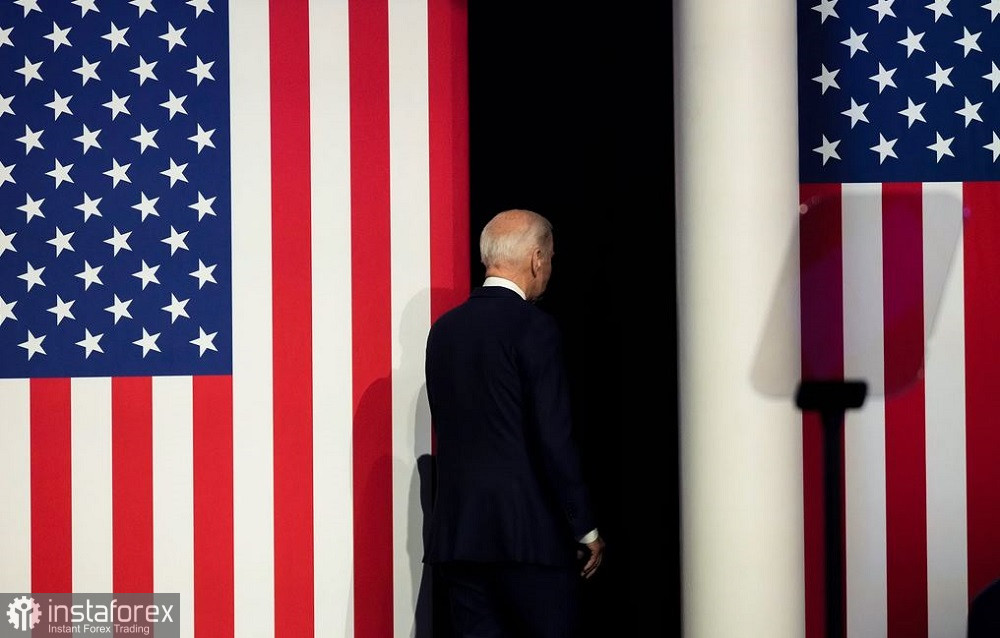The EUR/USD pair opened a new trading week with a small but explosive rise. However, this momentum faded during the European session.
The EUR/USD pair opened a new trading week with a small but impulsive rise, testing the 1.09 level. But the bullish impulse faded and did not continue during the European session.
The initial bullish move in EUR/USD was driven by yesterday's sensational news: Joe Biden dropped out of the race. He announced that he would not run for the US presidency "in the interests of the Democratic Party." Rumors about the President's withdrawal from the race had been published in the American press since the end of last week. However, Biden denied such intentions until the last moment. Reportedly, the top officials in the President's office were informed about his decision to end his campaign just a minute before the announcement was made.
Nevertheless, the news was unveiled: Joe Biden dropped out of the race. Now Vice President Kamala Harris is the most likely opponent for Donald Trump. The Times, citing a conducted poll, claims that she potentially has a better chance of defeating the Republican than the current US leader.

Therefore, EUR/USD traders reacted to Biden's "resignation" with a price increase, but this rise faltered within a few hours.
The issue is that Kamala's nomination does not guarantee her victory. Various polls indicate that Harris's approval rating is about as low as Biden's, and her chances of defeating the Republican in a head-to-head match are similarly low.
First, Kamala still needs to become the candidate. Biden's endorsement does not guarantee anything. Formally, the Democratic Party does not have a candidate at this moment. A convention is set to take place on August 19 in Chicago, where the vote will occur. It is far from certain that Harris will unite the delegates, especially since she is not the only potential candidate. Potential rivals include US Transportation Secretary Pete Buttigieg and Michigan Governor Gretchen Whitmer. Furthermore, Democrats will attempt to promote another candidate. For instance, the Clintons support Harris, but Barack Obama remained silent on her, calling for new primaries to determine the Democratic candidate. Other leading Democrats, such as Senate Majority Leader Chuck Schumer, House Minority Leader Hakeem Jeffries, and former Speaker Nancy Pelosi, have also refrained from endorsing Kamala Harris so far.
Importantly, part of the US political establishment considers Kamala too unpopular. She has little political experience. Like Joe Biden, she is notorious for making gaffes, so she is not better than Biden. The American press has repeatedly noted that her public speeches are often incoherent and lacking in substance.
In other words, it is too early for the Democrats to be "popping the champagne." The most difficult and unpredictable stage of the election race is still ahead.
Moreover, independent US presidential candidate Robert Kennedy Jr. criticized the president's choice, thereby playing into Trump's hands. According to him, Biden's current policy "is Kamala Harris," who has never stated that there is any difference between her and President Biden. Incidentally, she was responsible for overseeing migration and border issues.
With an almost empty economic calendar on Monday, EUR/USD traders are forced to react to major political events in the US. Last week, the dollar's rise was largely due to the strengthening of Donald Trump's rating, who has already announced a new trade war with China. At the start of this week, market participants are reacting to the personnel changes within the Democratic Party.
In my opinion, political passions will calm down a bit this week. The Democrats will prepare for the August convention, and Donald Trump will continue his campaign tour across the country. Barring any force majeure, the topic of American politics will temporarily take a backseat, and currency market traders will focus on classic fundamental factors. Let me remind you that on Thursday, we will learn about the growth dynamics of the US GDP in the second quarter. On Friday, the June value of the core PCE index, the Federal Reserve's preferable inflation indicator, will be released.
So, how to trade EUR/USD? Should you open long positions? Should you go short? It should be noted that EUR/USD sellers were unable to break through the support level of 1.0870 (Tenkan-sen line on the D1 timeframe). Even on Friday, when the prive was confidently falling, traders stopped near this price barrier. Therefore, short positions (with a target of 1.0820) will only be relevant if the bears manage to consolidate below this support level. Long positions are risky by default, given the empty economic calendar and political turbulence in the US (anti-risk sentiments may rise during the American trading session). It is most advisable to take a wait-and-see approach due to the high degree of uncertainty.





















